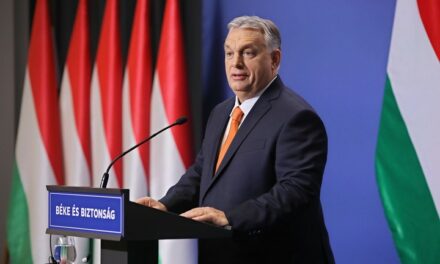The longer the war in Ukraine lasts, the more powerful the geopolitical effects of the military clash will be. What does war mean to us and how do we deal with it, especially with regard to its effects on Europe?
In August, it has been half a year since Russia's war of aggression against Ukraine began, and we still do not see the end of the hostilities. At first, many European citizens were enthusiastic about the courage and fighting spirit of the defending Ukrainians, but this is increasingly being followed by sobering up. Due to the impending shutdown of nuclear power plants, the situation is particularly acute in Germany. Meanwhile, more and more analysts share the Hungarian position on the war and its effects.
The belief of the Hungarians
Already at the beginning of the clashes, the Hungarians consistently formulated their unanimous position regarding the war, which they later consistently adhered to without any tactics or sudden change of direction: they condemn the Russian aggression, we support Ukraine with humanitarian supplies and financially, they recognize the country's right to territorial integrity and national independence, and embrace the nearly 800,000 refugees arriving in the country. By accepting and caring for Ukrainian refugees, Hungary demonstrated humanity and compassion. Hungary has equally clearly supported the new and new sanctions of the European Union, although the Hungarian political leadership has emphasized again and again that it only joins the sanctions in the spirit of European solidarity and does not actually believe in their effectiveness. In addition, the Hungarian government confirmed that it supports Ukraine's EU accession application.
On the other hand, unlike many Western European capitals, the Ukrainian flag does not fly in Budapest or other Hungarian cities, and Hungarians view today's Ukraine from a distance and on the ground of reality, as the country and its politics are not completely alien to them. This is primarily because the way the Ukrainian state and many Ukrainian citizens treat the native Hungarian national minority living there, numbering around 150,000 people, is considered problematic. This minority was exposed to the fluctuating conditions again and again, but especially since 2014, its situation has worsened more and more.
The position of some other countries
In addition to the huge wave of solidarity with Ukraine and the acceptance of refugees from there, Europe unanimously decided to impose a wide variety of economic sanctions against Russia. In addition, Ukraine's future membership in the European Union was put into perspective. In this respect, therefore, no deviation from the Hungarian position can be discovered. On the other hand, the issue of energy import sanctions and arms shipments has much more serious consequences, as it exposes the difference of opinion and thus burdens the foreign policy relations between the individual European countries. While the compromise on sanctioning energy carriers has been outlined and Russian crude oil can be brought in by land without change, and the sanctioning of natural gas imports is not even on the agenda, at least for the time being, there is a strong divide between positions on the issue of weapons shipments and a controversial situation often arises.
Many countries still believe that Ukraine can win a defensive war, and at the same time, they believe that the Ukrainians' chances of repressing the aggressor increase proportionally with the number and quality of weapons delivered from the West. However, this line of thinking ignores the fact that Russia probably has greater reserves in terms of military, manpower and economy. On the other hand, the Hungarian position focuses on the question that the war should end as soon as possible, with a compromise acceptable to both sides, an armistice and finally a peace treaty. According to the perception represented in Budapest, the arms shipments would only prolong the war, all the more so because, according to experience so far, Russia has always been strengthened by the prolongation of the war.
The balance of the last six months is sobering
But after six months, where is Ukraine and where is Europe? During half a year of war, Russia conquered a significant part of Ukraine, the territorial division of the country is becoming an increasingly realistic scenario. Countless people lost their lives on both sides. In international debates, it is often overlooked that nearly 100 ethnic Hungarian soldiers have already fallen on the Ukrainian side, as members of the regular Ukrainian army.
Both warring parties confidently announce that they want to win the war. A peaceful settlement of the conflict is an increasingly distant hope. The longer the war goes on, the more determined and less lenient the warring parties become, as both have more and more to lose. You've already invested too much, ruined it and lost it - in such a situation, indulgence seems like a sign of weakness. With each passing month of the war, it becomes more and more difficult to abandon previous positions.
Dreams and reality
The West's basic assumption that Ukraine would be able to repulse or even defeat Russia increasingly belongs to the category of wishful thinking that is far from reality. No matter how much Ukraine is on the morally good side, the less we should allow ourselves to indulge in wishful thinking far from reality. This is also why a realistic situation assessment is important.
The tactic according to which the sanctions cause significant damage to Russia, while leaving us untouched by all of this, has also proven to be a net further form of self-delusion. In today's situation, rising energy prices around the world have resulted in the strange situation that, although Russia exports much less raw materials to the West, it can still post record revenues due to the higher prices. Russia soon compensated for the lack of Western exports with exports to India and China.
In addition, it seems that in many Western capitals of the world they have not even thought about the fact that Russia is not only isolated at the international level, despite the aggressive offensive war, but also maintains prosperous business, economic and political relations with many countries, and even expands them. Most of these countries, such as the BRICS states, do not support the West's policy towards Russia.
And Brazil, India and South Africa (or even Israel) are not Russian-friendly, semi-authoritarian states at all, but democracies where they focus on their own national interests and do not really know what to do with the distant war between two Slavic brother nations taking place in the very far eastern ends of Europe to start, and I absolutely do not want them to be dragged into this struggle.
Failed foundations
Hungarian Prime Minister Viktor Orbán recently expressed this with a fitting metaphor: "We are sitting in a car with a flat tire on all four wheels" and all four need to be replaced. By this he meant the basic assumptions outlined earlier, which without exception have been proven wrong. According to Viktor Orbán, it is time to change the policy towards Russia, all the more so because Europe itself is also suffering from its own strategic mistakes.
The direct impact of the failed sanctions policy is the high energy price, inflation, the looming economic crisis and, above all, the energy shortage that will soon hit Germany, which will be free of nuclear energy based on green hopes (and legal frameworks).
While Europe is the loser of the war, the three great powers, the United States of America, China and Russia, are all among the winners. And Ukraine loses the war in the same way as Europe as a whole, which is less and less able to realize its strategic sovereignty. Therefore, it is not so surprising that not all global players have an interest in ending the war as soon as possible.
More and more doubters are voicing their opinion
The position of tiny Hungary is far from being an idle word. Recently, the world-renowned Scottish historian, Niall Ferguson, drew attention to the fact that the sanctions are ineffective, since Russia can still sell energy carriers to other countries and that the sanctions do not make the slightest impression on its political leadership. Ferguson now expects that as war apathy grows, support for Ukraine will decline.
"It is possible that if Trump was re-elected, Putin would not have entered Ukraine," speculates the famous Harvard University professor. Incidentally, Viktor Orbán also shares this opinion. At the Tusnádfürdő in Transylvania, he said: "If Trump remains the president of the USA and Merkel remains the German chancellor, there will be no war today."
Recently, one of the grand old men of German politics, Klaus von Dohnanyi, at the MCC Fest in Esztergom, doubted whether it would be in the interest of the United States of America to end the war. He encouraged the Europeans to push Ukraine to make peace as soon as possible. In his recently published Hungarian-language book "National Interests" and in his recent statement, he emphasized the importance of an independent European policy that protects and takes into account national values.
Dohnanyi also doubted that the sanctions against Russia would be effective and drew a historical parallel with the sanctions against Iran and Iraq, which in no case met the expectations placed on them. In his opinion, sanctions only serve the domestic audience by satisfying their own voters, demonstrating the ability of politics to act. According to him, the United States has no interest in a strong Europe, since they need Europe for their own security and as a bridgehead.
von Dohnanyi: Make the Hungarian position more widely known!
Von Dohnanyi referred to the "monochrome" German media, where there is no discussion of these issues. He recommended the Hungarians to bring this debate into the party politics in Berlin, for example, by emphasizing the Hungarian position on sanctions against energy carriers and explaining that this action strengthens Europe as a whole. "The Hungarian position deserves to be clearly presented in Europe," said the former mayor of Hamburg.
So the Hungarians still have a lot of work to do. The realist position, the return to one's own national interests and the striving for a peaceful solution to the armed conflict are now the hallmarks of Hungarian politics. It is a significant but not entirely hopeless challenge to spread and implement this policy throughout Europe. In many countries of the continent, the debate about this is just starting. It's time for a new way of thinking!
Source: Hungarian-German Institute/Bence Bauer
Featured image: Source: Sergei SUPINSKY / AFP













